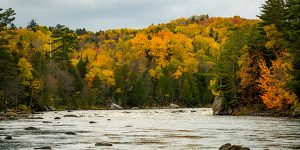
This panel discussion will be held virtually via Zoom and in-person at 107 Norman Smith Hall, UMaine, Orono.
- Virtual attendance: Complete the registration form for Zoom connection information
Panelists:
- Chuck Loring, Penobscot Nation
- Betsy Cook, Maine State Director, Trust for Public Land
- Darren Ranco, Chair, Native American Programs, University of Maine
Land return, rematriation (rebuilding traditional Indigenous stewardship and caretaking practices to ancestral places), and conservation work led by Indigenous peoples intersect with several of the key issues impacting the well-being and cultures of our Indigenous nations. This includes, but is not limited to, issues of environmental and climate justice, food sovereignty, health, and economic justice. As a practice, land returns are being done by land trusts without easements or restrictions, while at the same time scholars have recognized that Indigenous leadership, knowledge, and decision-making in conservation work also represent conservation best practices — resulting in the most effective ways to conserve lands productively for climate resilience and biodiversity.
Chuck Loring is a citizen of the Penobscot Nation. In his work duties, he provides oversight to the Nation’s natural resources department. His background is in Forestry, and he is a UMaine alum who graduated in 2012. He has worked for the Nation’s natural resources department in various capacities since then. Though his path has been through forestry, Chuck feels a deep connection to not only the forest, but the animals within it. When he isn’t in the office you can find him on any one of the various Penobscot territories with his daughter doing anything from collecting shed antlers to hunting moose.
Betsy Cook is the Maine State Director for the Trust for Public Land’s (TPL). She is committed to ensuring all Mainers have equitable access to the outdoors. Betsy joined TPL in 2017 and during her time has worked with communities across the state to create over 25,000 acres of new public lands, parks, and community forests. Previously, Betsy worked with the New England Forestry Foundation, and Triangle Land Conservancy and Duke Forest, both in Durham, North Carolina. Betsy discovered the power of public lands during her summers working in the White Mountain National Forest’s backcountry hut system. Betsy holds a BA from Cornell University and Master of Environmental Management and Master of Forestry from Duke University, where she completed her thesis on community forests. Betsy lives in Portland and enjoys exploring all corners of Maine by cross-country skiing, hiking, and paddling with her spouse, Jesse, their two kids, Nora and Malcolm, and their energetic dog, Banjo.
Darren J. Ranco, a citizen of the Penobscot Nation, is a professor of anthropology, Chair of Native American Programs, and faculty fellow at the Mitchell Center for Sustainability Solutions at the University of Maine. He has a master of studies in environmental law from Vermont Law School and a doctorate in social anthropology from Harvard University. His research focuses on the ways in which Indigenous Nations resist environmental destruction by using Indigenous science and diplomacies to protect their natural and cultural resources. He has published extensively and teaches classes on Indigenous intellectual property rights, research ethics and methodology, environmental and climate justice, and tribal governance.


